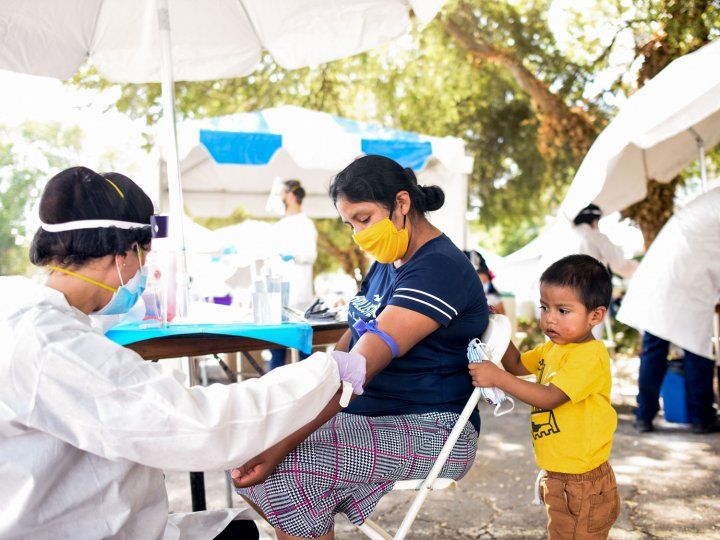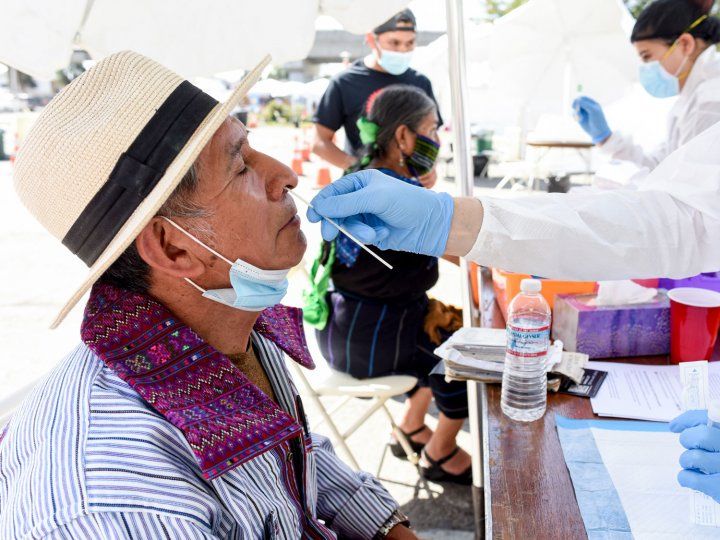Severe COVID-19 Impacts on Latinx, Maya Families Highlighted by Fruitvale Testing Initiative

Rosa Gomez Pablo gets a blood test for COVID-19 antibodies while her son Josue Pablo, age 2, watches. Photo by Barbara Ries
COVID-19 test results from a two-day community testing event in Oakland’s Fruitvale district in September highlight the pandemic’s continued outsize health and economic impact on the Latinx population — and also the neighborhood’s large Maya population — and point to opportunities to direct more resources to these communities.
Latinx communities have been among the hardest hit by the pandemic nationwide and across the Bay Area as a result of long-standing economic and health inequalities. As of early August, half of all cases in Alameda County, where Oakland is located, were among Latinx people (6,514 total cases), with Fruitvale, with 50 percent Latinx residents, as the county’s hardest hit neighborhood (1,365 total cases).
It is estimated that Maya people with Guatemalan roots, who primarily speak a language known as Mam as their first language, are the fastest growing ethnic group in Oakland, with Fruitvale as a long-standing hub of this community. But the neighborhood’s vibrant Mayan population is also particularly vulnerable to COVID-19’s health and economic impacts — for the same pre-existing economic factors as seen in the larger Latinx community, which are even more acute among the Maya population.
The Sanando Juntos testing initiative — part of UCSF’s Unidos En Salud community partnership, which is supported by the UCSF COVID Community Public Health Initiative — set out to provide free COVID-19 PCR and antibody testing for people of all ages in the district with two main goals: to provide supportive services to community members who test positive and to gather information about the pandemic’s impact on the neighborhood in order to inform the local public health response. PCR results were analyzed at the CLIAhub, a diagnostic laboratory operated by UCSF and Chan Zuckerberg Biohub that has been providing PCR test results for public health departments across the state as well as UCSF's many community testing initiatives.
Held on Sep. 26 and 27, 2020, in the parking lot of the Fruitvale BART (Bay Area Rapid Transit) station, the initiative performed 1,099 PCR tests and 859 antibody tests. They found an overall PCR-positive rate — indicating active infection — of 3.5 percent, but the infection rate was considerably higher in Latinx (5.2 percent) and Maya individuals (8 percent). Prevalence of infection was particularly high among Latinx children, with one in ten testing positive on PCR-based tests. Infection prevalence in non-Latinx individuals was only 0.5 percent.

Pedro Ramirez receives a nose swab as part of a free COVID-19 testing campaign in Fruitvale. Photo by Barbara Ries
The initiative found that overall, 9.7 percent of individuals tested had antibodies against the SARS-CoV-2 virus, indicating prior exposure to the virus. The finding of high positivity on antibody tests and lower PCR indicates the tail end of a surge, the researchers say. But the researchers point to their finding of an astounding 27 percent antibody prevalence among Mayan-speakers as evidence of the profound impact the pandemic has already had on this population.
Demographic data collected by the researchers show that large household size continues to be a major risk factor for the Latinx population, and for Maya as well. These populations also reported higher economic pressure to continue working outside the home, including significant impacts on job security and income, as well as severe food insecurity and lower access to healthcare.
While working outside the home was reported as one of the highest exposure risks for both Latinx and Maya participants, Maya people particularly highlighted church attendance as a key concern. The researchers suggest that outreach via churches and Spanish-language television — a major source of COVID-19 news for both groups, could present valuable opportunities for education about supportive services for these communities.
"Fruitvale has been doubly punished by COVID-19 — first, in the numbers infected, and second, in the resulting economic impact that has led to severe food insecurity and economic distress," said Alicia Fernández, MD, director of the UCSF Latinx Center of Excellence and a partner in the Fruitvale testing initiative. "The tragic irony of this pandemic is that poverty makes people more exposed to both the virus itself and to the economic hardships caused by our efforts to control it. As a society, we need to do more to protect these workers and their families on both fronts, because the health of all of us depends on the health of each of us."
The testing collaborative includes the Resilient Fruitvale Task Force, a coalition of organizations led by The Unity Council that includes La Clínica, Street Level Health Clinic; Native American Health Center; Oakland Unified School District; Alameda County Public Health Department; La Familia; and Oakland Public Library.
See the Unity Council’s press conference with Oakland Mayor Libby Schaaf to announce the findings here.
See full details of the findings on the initiative’s website here.